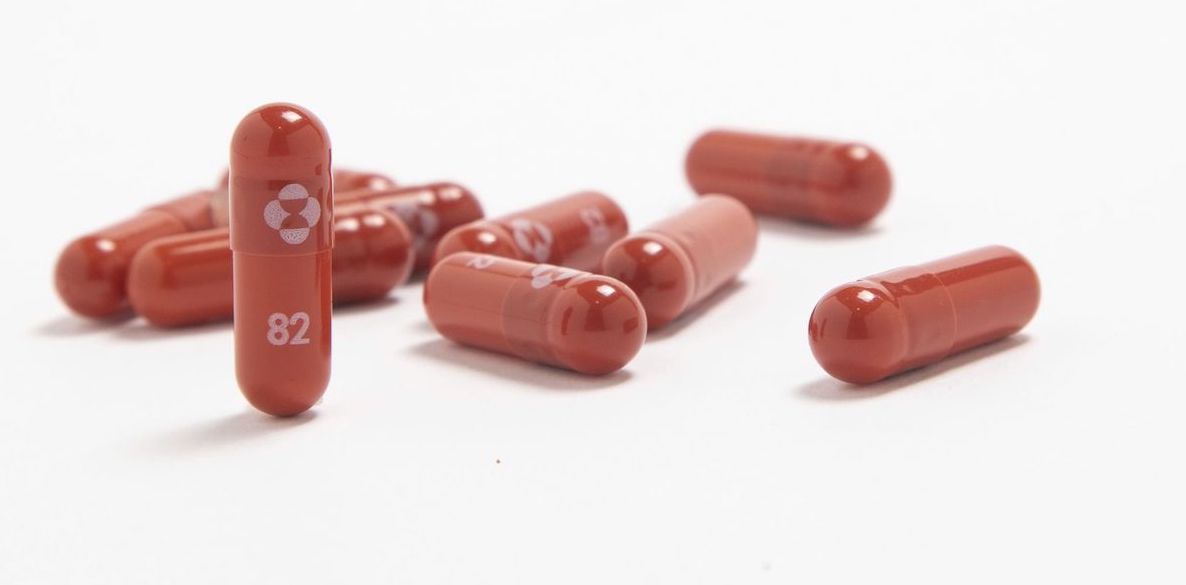<< Back
Here’s a Look at the New COVID-19 Pills From Merck, Pfizer

November 17, 2021
The defense against the spread of COVID-19 could soon enter a new stage with the development of two oral treatments that in clinical trials have effectively protected at-risk patients with new infections from hospitalization and death.
Both Merck (Molnupiravir) and Pfizer (Paxlovid) have submitted their new drugs for emergency use authorization by the Food and Drug Administration after clinical studies limited to unvaccinated patients at high risk of severe illness from COVID-19. Already, the federal government reportedly will purchase 10 million courses of Pfizer’s treatment, costing $5 billion.
The effectiveness of these drugs on fully vaccinated people with breakthrough infections remains untested. But vaccinations already reduce the risk of hospitalization and death, leaving fewer infections for the new drugs to treat.
For the at-risk and unvaccinated population, however, the oral treatments are considered a major advancement.
“We don’t really have oral therapies for coronavirus at this point,” says Dr. Ulysses Wu, Hartford HealthCare’s System Director of Infection Disease and Chief Epidemiologist. “Our only therapy is an intravenous infusion that we give, usually in either an acute-care setting or in monitored setting.”
Those one-time infusions, monoclonal antibodies available from Regeneron Pharmaceuticals and Eli Lilly, take about an hour. In clinical trials, Regeneron’s treatment reduced the risk of hospitalization or death by 70 percent compared to a placebo. Eli Lilly’s treatment reduced the risk of each by 87 percent in clinical trials. The infusions are more costly and less convenient for patients, which could quickly make the take-at-home pills the preferred treatment when they become available.
Here’s a look at the two new drugs:
Molnupiravir
Manufacturer: Merck, with Ridgeback Biotherapeutics.
Availability: The Food and Drug Administration’s advisory committee is scheduled to meet Nov. 30 to discuss Merck’s application for emergency use authorization of the drug.
How it works: Molnupiravir (shown above), is a polymerase inhibitor that introduces errors into the virus’ genetic code, producing random mutations that make it hard for the virus to replicate and become resistant. This drug actually acts very much like one of RNA’s chemical building blocks. The virus uses these building blocks when it tries to replicate, only to introduce more and more mistakes.
Dosage: 40 pills in five days.
Effectiveness in clinical trials: Reduced the risk of hospitalization or death by about 50 percent in patients vulnerable to severe illness when treatment began within five days of illness. The drugmaker did not provide data on patients who received the treatment in the first three days of their illness.
Possible side effects: Merck said 12 percent of patients who received the drug and 11 percent who received a placebo experienced adverse reactions.
Possible health risks: Other drugs like Molnupiravir have been associated with birth defects in animal studies when given for longer periods. Merck says its drug, in longer studies and at higher doses used in humans, did not cause birth defects or cancer.
 Pfizer’s antiviral drug Paxlovid.
Pfizer’s antiviral drug Paxlovid.
Paxlovid
Manufacturer: Pfizer.
Availability: The drugmaker requested emergency use authorization Tuesday for its drug from the FDA. It’s uncertain when the FDA’s advisory committee will meet to discuss data submitted by the drugmaker.
How it works: A combination of two protease inhibitors, a booster drug called ritonavir and an experimental molecule (PF-07321332), block an enzyme that turns long strands of nonfunctional viral proteins into smaller, functional proteins. The experimental molecule attacks the virus and ritonavir prevents a liver enzyme from attacking and likely destroying the experimental molecule. Ritonavir, made by AbbVie, is also combined with antiviral drugs to treat HIV.
Dosage: 30 pills in five days.
Effectiveness in clinical trials: Reduced hospitalizations by 89 percent and prevented deaths in patients who began treatment within three days of their illness.
Possible side effects: Pfizer reported mild side effects, though it did not describe them, at the same rate as patients receiving a placebo.
Possible health risks: Protease inhibitors can interfere with certain cancer treatments. Cancer patients should talk to their doctor before considering use of this drug when it becomes available.